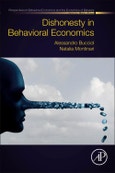Dishonesty in Behavioral Economics provides a rigorous and comprehensive overview of dishonesty, presenting state-of-the-art research that adopts a behavioral economics perspective. Throughout the volume, contributors emphasize the effects of psychological, social, and cognitive factors on the decision-making process. In contrast to related titles, Dishonesty in Behavioral Economics emphasizes the importance of empirical research methodologies. Its contributors demonstrate how various methods applied to similar research questions can lead to different results. This characteristic is important because, of course, it is difficult to obtain reliable measures of dishonesty.
Please Note: This is an On Demand product, delivery may take up to 11 working days after payment has been received.
Table of Contents
Section 1: Dishonesty in behavioral economics: An overview 1. Dishonesty in behavioral economics: An overview
Section 2: Dishonesty among children and young adults 2.1 Dishonesty in young children 2.2 Dishonesty among children: Rural/urban status and parental migration 2.3 What does a young cheater look like? An innovative approach 2.4 Dishonesty among university students 2.5 Cheating in academic exams: A field study
Section 3: Dishonesty, individual, and social preferences 3.1 Do economists lie more? 3.2 Cheating and altruism by discipline 3.3 Negative externalities of cheating: An experiment with charities 3.4 Cheating: Perceptions and profit 3.5 An experiment on conformity in deception
Section 4: Dishonesty in daily life 4.1 Fare-dodging in the lab and the moral cost of dishonesty 4.2 The cost of being honest: Excessive change at the restaurant 4.3 Prosociality and fiscal honesty: Tax evasion in Italy, United Kingdom, and Sweden 4.4 Can upfront declarations of honesty improve anonymous self-reports of sensitive information?








